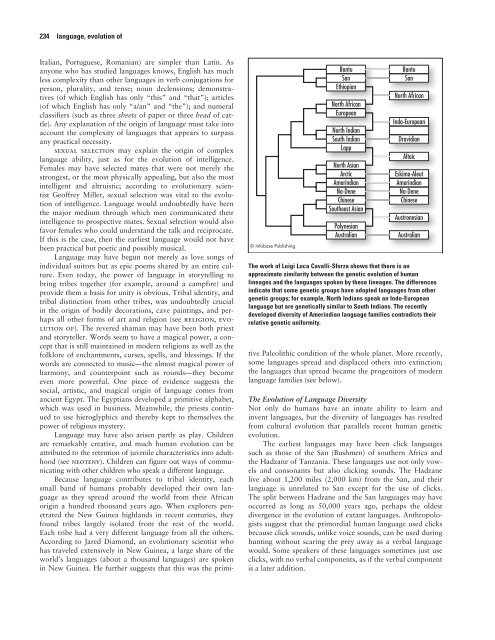Encyclopedia of Evolution.pdf - Online Reading Center
Encyclopedia of Evolution.pdf - Online Reading Center
Encyclopedia of Evolution.pdf - Online Reading Center
You also want an ePaper? Increase the reach of your titles
YUMPU automatically turns print PDFs into web optimized ePapers that Google loves.
language, evolution <strong>of</strong><br />
Italian, Portuguese, Romanian) are simpler than Latin. As<br />
anyone who has studied languages knows, English has much<br />
less complexity than other languages in verb conjugations for<br />
person, plurality, and tense; noun declensions; demonstratives<br />
(<strong>of</strong> which English has only “this” and “that”); articles<br />
(<strong>of</strong> which English has only “a/an” and “the”); and numeral<br />
classifiers (such as three sheets <strong>of</strong> paper or three head <strong>of</strong> cattle).<br />
Any explanation <strong>of</strong> the origin <strong>of</strong> language must take into<br />
account the complexity <strong>of</strong> languages that appears to surpass<br />
any practical necessity.<br />
sexual selection may explain the origin <strong>of</strong> complex<br />
language ability, just as for the evolution <strong>of</strong> intelligence.<br />
Females may have selected mates that were not merely the<br />
strongest, or the most physically appealing, but also the most<br />
intelligent and altruistic; according to evolutionary scientist<br />
Ge<strong>of</strong>frey Miller, sexual selection was vital to the evolution<br />
<strong>of</strong> intelligence. Language would undoubtedly have been<br />
the major medium through which men communicated their<br />
intelligence to prospective mates. Sexual selection would also<br />
favor females who could understand the talk and reciprocate.<br />
If this is the case, then the earliest language would not have<br />
been practical but poetic and possibly musical.<br />
Language may have begun not merely as love songs <strong>of</strong><br />
individual suitors but as epic poems shared by an entire culture.<br />
Even today, the power <strong>of</strong> language in storytelling to<br />
bring tribes together (for example, around a campfire) and<br />
provide them a basis for unity is obvious. Tribal identity, and<br />
tribal distinction from other tribes, was undoubtedly crucial<br />
in the origin <strong>of</strong> bodily decorations, cave paintings, and perhaps<br />
all other forms <strong>of</strong> art and religion (see religion, evolution<br />
<strong>of</strong>). The revered shaman may have been both priest<br />
and storyteller. Words seem to have a magical power, a concept<br />
that is still maintained in modern religions as well as the<br />
folklore <strong>of</strong> enchantments, curses, spells, and blessings. If the<br />
words are connected to music—the almost magical power <strong>of</strong><br />
harmony, and counterpoint such as rounds—they become<br />
even more powerful. One piece <strong>of</strong> evidence suggests the<br />
social, artistic, and magical origin <strong>of</strong> language comes from<br />
ancient Egypt. The Egyptians developed a primitive alphabet,<br />
which was used in business. Meanwhile, the priests continued<br />
to use hieroglyphics and thereby kept to themselves the<br />
power <strong>of</strong> religious mystery.<br />
Language may have also arisen partly as play. Children<br />
are remarkably creative, and much human evolution can be<br />
attributed to the retention <strong>of</strong> juvenile characteristics into adulthood<br />
(see neoteny). Children can figure out ways <strong>of</strong> communicating<br />
with other children who speak a different language.<br />
Because language contributes to tribal identity, each<br />
small band <strong>of</strong> humans probably developed their own language<br />
as they spread around the world from their African<br />
origin a hundred thousand years ago. When explorers penetrated<br />
the New Guinea highlands in recent centuries, they<br />
found tribes largely isolated from the rest <strong>of</strong> the world.<br />
Each tribe had a very different language from all the others.<br />
According to Jared Diamond, an evolutionary scientist who<br />
has traveled extensively in New Guinea, a large share <strong>of</strong> the<br />
world’s languages (about a thousand languages) are spoken<br />
in New Guinea. He further suggests that this was the primi-<br />
The work <strong>of</strong> Luigi Luca Cavalli-Sforza shows that there is an<br />
approximate similarity between the genetic evolution <strong>of</strong> human<br />
lineages and the languages spoken by these lineages. The differences<br />
indicate that some genetic groups have adopted languages from other<br />
genetic groups; for example, North Indians speak an Indo-European<br />
language but are genetically similar to South Indians. The recently<br />
developed diversity <strong>of</strong> Amerindian language families contradicts their<br />
relative genetic uniformity.<br />
tive Paleolithic condition <strong>of</strong> the whole planet. More recently,<br />
some languages spread and displaced others into extinction;<br />
the languages that spread became the progenitors <strong>of</strong> modern<br />
language families (see below).<br />
The <strong>Evolution</strong> <strong>of</strong> Language Diversity<br />
Not only do humans have an innate ability to learn and<br />
invent languages, but the diversity <strong>of</strong> languages has resulted<br />
from cultural evolution that parallels recent human genetic<br />
evolution.<br />
The earliest languages may have been click languages<br />
such as those <strong>of</strong> the San (Bushmen) <strong>of</strong> southern Africa and<br />
the Hadzane <strong>of</strong> Tanzania. These languages use not only vowels<br />
and consonants but also clicking sounds. The Hadzane<br />
live about 1,200 miles (2,000 km) from the San, and their<br />
language is unrelated to San except for the use <strong>of</strong> clicks.<br />
The split between Hadzane and the San languages may have<br />
occurred as long as 50,000 years ago, perhaps the oldest<br />
divergence in the evolution <strong>of</strong> extant languages. Anthropologists<br />
suggest that the primordial human language used clicks<br />
because click sounds, unlike voice sounds, can be used during<br />
hunting without scaring the prey away as a verbal language<br />
would. Some speakers <strong>of</strong> these languages sometimes just use<br />
clicks, with no verbal components, as if the verbal component<br />
is a later addition.


